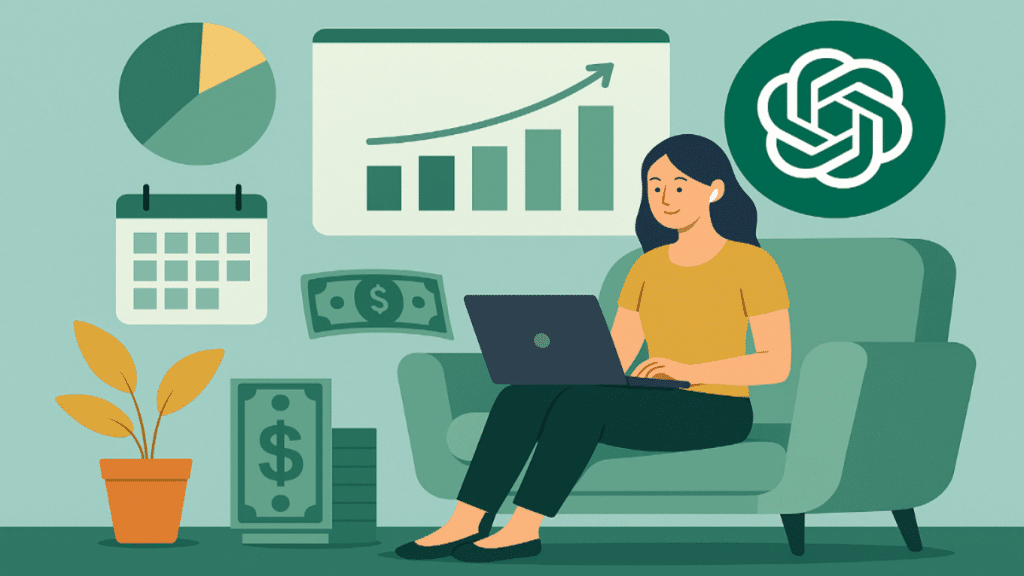For decades, managing money meant sticking to spreadsheets, setting reminders on calendars, and hoping not to forget a bill or miss a savings target. In 2025, a quiet shift is underway: more people in the UK are embracing “AI-first” money management—routines powered by tools like ChatGPT chatbot that automate busywork, surface smarter options, and turn finance from a source of stress into something quietly under control.
The End of Manual Money Admin
Traditional budgeting relies on discipline: inputting receipts, tracking categories, reviewing statements by hand. But with the arrival of everyday AI, many now use ChatGPT for a conversational approach:
- Describe their habits (“I’ve noticed my coffee and lunch spending is up this month; can you review where else my money’s going?”)
- Ask for pattern recognition (“Spot any subscriptions I forgot to cancel, or unusual spikes in household bills.”)
- Get a digestible summary (“Show my top three expenses last quarter, and any trends that look risky for the next few months.”)
Instead of scrambling to make sense of data, users receive clear feedback, simple visualizations, and tailored advice, all in plain English.
Building Smarter Routines—Not Just Faster Automation
AI-first routines aren’t about handing everything over to a bot. Rather, they allow users to set up repeatable workflows for the financial tasks they care about:
- Reviewing accounts every Friday afternoon with a ChatGPT-generated checklist
- Setting up monthly “spend audits” to catch any surprise charges before they snowball
- Asking for a summary of upcoming bills, renewals, or tax obligations at the start of every month
This shift from reactive to proactive turns money management into a habit, not an afterthought.
Smarter Decisions, Not Just Faster Responses
AI tools now help households and small businesses make more informed choices:
- Running “what if” simulations: “If I move £100 a month to my ISA, how quickly will I hit my holiday savings goal?”
- Comparing two job offers or mortgage options by breaking down after-tax income, cost of commuting, and regional expenses
- Helping freelancers decide if a new contract’s day rate really covers time lost to admin, with a ChatGPT-calculated estimate
These scenarios empower users to weigh options—before they make a commitment.
Reducing Stress Around Bills, Deadlines, and Surprises
For many, money stress comes from uncertainty: missing a payment, forgetting a renewal, or underestimating expenses. ChatGPT-powered reminders and audit routines now let users:
- Schedule prompts for regular bills (“Remind me three days before my council tax is due and flag if there’s been a rate change.”)
- Summarise new expenses from the last statement, with notes on recurring or annual payments
- Highlight free trials or expiring deals before they become full-price subscriptions
Gemini and Claude—other leading AI assistants—can double-check for missed items, audit for duplicate charges, or review annual spending for hidden “leaks.”
From Friction to Flow: How Chatronix Makes AI Routines Stick
One reason AI-first money management is gaining momentum is the rise of platforms like Chatronix. Instead of recreating the wheel every pay period, users now:
- Save their most useful budgeting and review prompts in a library
- Tag routines for tax season, bill reviews, or annual goal planning
- Archive their favorite spending summaries, savings simulations, and notification scripts
- Pull up the exact workflow they need—whenever life changes or a new financial question pops up
By turning AI routines into reusable templates, Chatronix helps people stick with good habits, even when life gets hectic.
Everyday Examples: Where AI-First Management Shines
- Young professionals: Use ChatGPT to set up automatic rent and bill reminders, audit spending on food delivery vs. groceries, and get plain-English explanations of pension options.
- Families: Schedule monthly reviews of school fees, holiday savings, and childcare costs; use AI to draft emails to utilities or landlords when rates change or bills go awry.
- Freelancers and side hustlers: Automate invoicing, track project income vs. expenses, and get early warnings if cash flow looks tight for the next quarter.
- Retirees: Summarise annual income and outgoings, flag unexpected medical or insurance costs, and get reminders to check interest rates on savings.
Not a Substitute for Regulated Advice—But a Powerful Ally
AI-first money routines don’t replace the need for professional advice on complex matters. But for day-to-day control, they’re already taking much of the stress and guesswork out of personal finance. People report feeling more organised, more confident, and less anxious about money—simply because fewer surprises crop up.
The Outlook: Quiet Progress, Greater Confidence
While AI isn’t about to eliminate financial stress for good, it’s changing the daily rhythm of how British households and small businesses interact with money. Fewer missed payments, more savings, and a sense of being ahead—not behind—are all within reach.
For those looking to build, save, and repeat their best AI-powered routines, more details and workflow libraries can be found at Chatronix.
